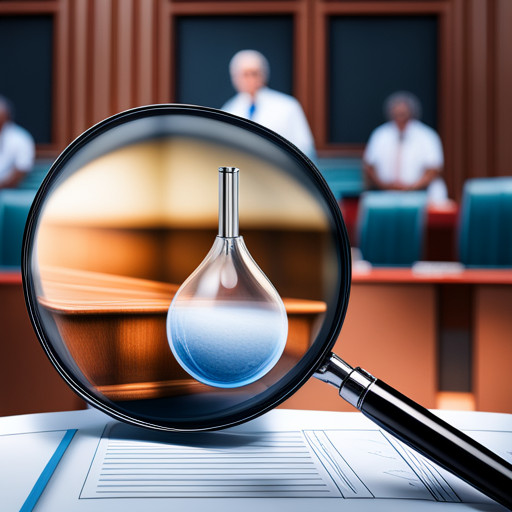Medical Records: The Most Potent Weapon in Toxic Water Lawsuits
This article explores the significant role of medical records in toxic water lawsuits.

It provides an analytical perspective on how these documents serve as potent evidence in court, focusing on case studies where such records have been decisive.
The challenges encountered in utilizing these records for litigation and potential solutions are also discussed, along with future implications for environmental lawsuits.
Key Takeaways
- Medical records provide tangible proof of health effects caused by contaminated water.
- Comprehensive medical records documenting the correlation between exposure and chronic diseases have substantiated claims.
- Breach of patient confidentiality through improper handling or unauthorized access can have serious legal implications.
- Advanced analytics tools and AI automate the process, reducing human error and saving time.
Understanding the Role of Medical Records in Toxic Water Lawsuits

In toxic water lawsuits, medical records play a pivotal role by providing tangible proof of health effects caused by contaminated water. These documents serve as firm evidence that can be assessed objectively to establish the link between exposure to toxic substances and observed health issues in individuals.
The use of medical records, however, raises important questions about Record Confidentiality and Patient Consent. The principle of confidentiality is central to trust between patients and healthcare providers. It binds medical professionals not to disclose any patient information without their consent. In legal cases such as toxic water lawsuits, this confidentiality must be respected even when these records are used for evidentiary purposes.
Patient Consent plays an equally significant role. Patients have a right to control who accesses their personal health information; hence, before using their medical records in court proceedings, explicit permission must be obtained from them. This process usually involves detailed explanation on why the disclosure is essential, how much information will be shared, potential risks associated with the release, and assurance that only minimal necessary data will be disclosed.
In conclusion, while medical records provide critical evidence in toxic water lawsuits proving detrimental health effects due to contamination exposure; it's crucial that principles of Record Confidentiality and Patient Consent are upheld rigorously throughout the process.
This ensures respect for individual rights and maintains trust in healthcare systems while allowing justice to proceed based on concrete proof provided by these documents. Any breach could undermine public confidence in both judicial and healthcare systems thereby complicating further similar lawsuits.
Gathering and Analyzing Medical Records for Legal Use

Gathering and analyzing health-related documentation for legal use involves meticulous scrutiny and expert understanding of both medical terminologies and legal regulations. In the digital era, the storage of these documents presents unique challenges known as Digital Storage Dilemmas. These dilemmas often involve issues such as data integrity, security breaches, system failures affecting the availability of records, and potential misuse of information.
Digital Storage Dilemmas necessitate effective management strategies that prioritize data protection while ensuring easy access for authorized personnel. This includes encryption technologies to secure sensitive data and robust backup systems to protect against loss from system malfunction or natural disasters.
Additionally, Ethical Considerations must be taken into account when gathering and storing health-related documents. These considerations include confidentiality, informed consent from patients for their records to be used in litigation processes, respect for patient autonomy in decision-making about their personal information usage, justice in terms of fair distribution of benefits and burdens associated with data use.
The process also requires adherence to legislative requirements such as Health Insurance Portability & Accountability Act (HIPAA) in the U.S., which provides federal protections for personal health information held by covered entities. Non-compliance can lead to severe penalties including fines or imprisonment.
Case Studies: How Medical Records Prevailed in Court

Case studies elucidating the role of health-related documentation in court proceedings provide insight into the multifaceted process of legal dispute resolution. In-depth exploration of these case studies reveals two central themes: record accessibility and confidentiality breaches.
In many toxic water lawsuits, accessibility to medical records has played a pivotal role in determining verdicts. A landmark case study involves a community exposed to polluted water supplies due to industrial negligence. Legal representatives were able to access comprehensive medical records that documented a correlation between the exposure and onset of chronic diseases amongst residents. The meticulous cross-analysis of such records with environmental assessments substantiated their claims, resulting in favorable judgments for affected parties.
However, another aspect that features prominently is the breach of patient confidentiality through improper handling or unauthorized access to medical documents. Confidentiality breaches can have serious legal implications both for healthcare providers and litigants involved in legal disputes where such records are presented as evidence. Instances from various jurisdictions illustrate cases where misuse or inappropriate disclosure of health-related information resulted in counter-lawsuits filed by aggrieved patients against offending parties, leading to punitive damages.
The Challenges and Solutions in Using Medical Records for Toxic Water Litigation

Utilizing health-related documentation for environmental litigation presents numerous challenges and necessitates innovative solutions to ensure optimal use and adherence to ethical norms. The shift towards digitization of medical records has added a new layer of complexity, presenting unprecedented digital transformation challenges that have brought about the need for innovative litigation solutions.
The process of obtaining, organizing, and analyzing large volumes of medical data can be laborious and time-consuming. Despite the potential benefits offered by digitalization, issues such as data incompatibility between different systems, lack of standardized formats, privacy concerns, and cyber threats are significant obstacles that must be addressed.
Innovative litigation solutions are paving the way forward in overcoming these hurdles. Advanced analytics tools are being developed to efficiently extract meaningful insights from vast amounts of unstructured data. Artificial Intelligence (AI) is increasingly being used to automate the process of sifting through countless pages or files of medical records, drastically reducing human error and saving precious time.
Simultaneously addressing privacy concerns remains paramount. Strong encryption methods are now employed to protect sensitive information from unauthorized access or breaches. Furthermore, blockchain technology is emerging as a viable solution for ensuring data integrity while maintaining transparency throughout the legal proceedings.
However substantial these advancements may seem, it's crucial not to overlook the importance of continuous improvement in these strategies. Both technical enhancements in handling digital health records and iterative refinement on legal procedures will pave an effective path towards utilizing health-related documentation in environmental litigations successfully.
Future Perspectives: Medical Records as Evidence in Environmental Lawsuits

Future perspectives on the use of health-related documentation in environmental litigation point towards an increased reliance on digital tools and strategies to overcome existing challenges. Technological advancements are envisaged to provide a more efficient means of collecting, storing, retrieving, and analyzing medical records for legal proceedings. These advancements might include blockchain technology for enhanced data security, artificial intelligence for improved data analysis, and cloud computing for better data accessibility.
Evidence validity is another area expected to be significantly impacted by technological progress. Electronic health records (EHRs) hold promise as they provide a comprehensive patient history with timestamps that can potentially validate the timing of exposure to toxic elements relative to the onset of related health issues. EHRs also reduce instances of human error compared to manually recorded information, increasing their reliability as evidence.
However, despite these advantages, potential risks associated with digitalization must be considered. Data breaches could compromise patient confidentiality while technical glitches could result in loss or misinterpretation of critical information. Therefore, robust safeguards need to be implemented alongside these technologies.
Frequently Asked Questions
What Are the Potential Health Risks Associated With Toxic Water Exposure?
Potential health risks associated with toxic water exposure include contamination symptoms such as gastrointestinal illnesses, reproductive issues, neurological disorders. Treatment options often involve mitigating exposure and addressing symptoms through medical intervention and lifestyle modifications.
How Can I Ensure That My Medical Records Are Kept Private During a Lawsuit?
Ensuring private medical records during a lawsuit involves invoking patient confidentiality rights, abiding by legal protections such as HIPAA in the US, and utilizing secure data sharing systems to prevent unauthorized access.
What Other Types of Evidence Can Be Used in Toxic Water Lawsuits Aside From Medical Records?
In toxic water lawsuits, beyond medical records, evidence may comprise witness testimonies and contaminant analysis. Witness accounts provide experiential data, while contaminant analysis offers scientific proof of harmful substances in the water supply.
How Can One Prevent Exposure to Toxic Water in the First Place?
Prevention of toxic water exposure can be achieved primarily through the use of advanced water filtration methods and the regular utilization of bottled water, thus eliminating direct consumption from potentially contaminated sources.
How Has Legislation Around Toxic Water Contamination Evolved Over the Years?
Legislative challenges around toxic water contamination have necessitated policy improvements over time. Regulatory measures have evolved to incorporate advanced scientific knowledge and public health considerations, reflecting a more comprehensive understanding of environmental hazards and their impacts.
Conclusion
In conclusion, the use of medical records in toxic water lawsuits provides a powerful tool for establishing causality and asserting liability.
Their analytical application can expose harmful environmental practices, thereby contributing to the preservation of public health.
Despite inherent challenges in gathering and interpretation, solutions exist that enhance their efficacy as evidence.
Therefore, it is expected that their role will continue to be pivotal in subsequent environmental lawsuits.

This post has been generated by AI and was not reviewed by editors. This is Not legal advice. Please consult with an attorney.




